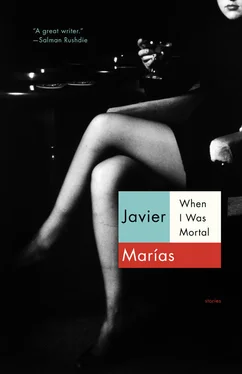Custardoy was prepared to work from photographs and from the report that an expert had drawn up years before, but he asked to see the painting at least once in order to make sure that the trick was feasible, and to that end he was invited by the nephew, who was called Cámara and who rarely visited his aunt, to spend a weekend at the house by the sea. The aunt lived alone with the young servant girl, little more than a child, for whom she bought text books and pencil cases: the girl went to school every morning in Port de la Selva, came back for lunch and spent the rest of the day and night waiting for her mistress to assign her some task. The aunt, whose surname was Vallabriga, spent all day and all evening in front of the television or talking on the phone to faded friends in Barcelona. More than her husband, who had died ten years before, she missed someone whom she had always missed during her marriage, a languid boyfriend from her youth, who went off with another woman — a minuscule, remote obsession. The aunt had a dog with three legs, its back right leg having been cut off after the dog spent a night with it trapped in a gin for rabbits. No one had gone to rescue it, the people round about had taken its howls for those of a wolf. According to her nephew Cámara, the aunt said that the look in the dog’s eyes reminded her of her lost and much-mourned boyfriend. “She’s completely gaga,” added the nephew. Señora Vallabriga used to take long walks by the seashore with the dog and the servant girl, three unfinished figures, the girl because she was still a child, the dog because of its missing leg, the aunt because of her false and her real widowhood.
Although Custardoy wears a ponytail and long sideburns and has lifts in his shoes (modernity misconstrued, a look considered reprehensible outside of big cities), he was well received: the aunt could flirt stiffly with him and the girl had something to do. After supper, the aunt took Custardoy and her nephew Cámara to see the Goya, which she kept in her bedroom, Doña María Teresa de Vallabriga , a distant ancestor bearing not the slightest resemblance to her oblique descendant. “Can you do it?” Cámara asked Custardoy in a low voice. “I’ll tell you tomorrow,” said Custardoy and then more loudly: “It’s a good painting, it’s a shame the background isn’t finished,” and he examined it closely, despite the fact that the light wasn’t good. The same light lit the bed much better. “No one will have visited that bed in ten years,” he thought, “possibly more.” Custardoy is always thinking about the contents of beds.
That night there was a storm and, from his room on the second floor, Custardoy heard the lame dog barking. He remembered the rabbit gin, that wouldn’t be the reason this time, though, but the thunder. He went over to the window to see if the dog was anywhere in sight, and he saw it there, by the rain-drenched sea — pellets falling on a shaken length of cloth — standing there like a tripod and barking at the zigzag lightning, as if he were waiting for each flash. “Perhaps there was a storm on the night when he got caught in the trap,” Custardoy thought, “and now he’s no longer afraid of the lightning.” He had just had that thought when he saw the little servant girl come running up in her nightdress, she was carrying a lead in her hand with which to secure the dog and drag him away. He saw her struggling, her body clearly outlined beneath her drenched clothes, and he heard an anguished voice immediately beneath his own window: “You’re going to get killed, you’re going to get killed!” said the voice. “Nobody sleeps in this house,” he thought. “Apart, perhaps, from Cámara.” He noiselessly opened the window and leaned out a little, not wanting to be seen. He felt the heavy rain on the back of his neck and what he saw from above was an opened black umbrella, Señora Vallabriga waiting anxiously for the return of those two unfinished figures, it was her voice, hers the bare arm that, from time to time, he could see reaching out from beneath the umbrella, as if she wanted to attract or grab both the dog and the little girl, struggling together, the dog with the missing leg could hardly run away or escape, it kept barking at the lightning that lit up its eyes, the reluctant eyes of a languid boyfriend, and the girl’s body that seemed more adult than it did when clothed — her body suddenly finished and complete. Custardoy wondered who it was that the aunt feared was going to be killed, and he soon found out, when the girl finally reached the door, dragging the dog, and the three of them disappeared, first beneath the umbrella like a cupola and then into the house. He closed the window and, from within, he heard just two more sentences, both spoken by the aunt, the girl must have been rendered speechless: “Look at that little mutt,” she said. And then: “Into bed this minute, my girl, and take that off.” Custardoy heard weary footsteps coming up to his floor and then, when he was once more lying down in bed and when silence had fallen after the final noise of one door closing — just one door — he wondered if perhaps he had been wrong about the bed that guarded the Goya and that no one would visit. He didn’t wonder too long, but he decided that the following morning he would commit an act of betrayal: the report he had to give to Cámara about the possibilities of a forgery would say that it wasn’t worth forging a copy. The young girl who would inherit the Goya had certainly earned it. He would tell Cámara: “Forget it.”
Note: The character of the servant girl and the implied lesbianism in this mini-story came about because the five obligatory elements imposed by the commission (a veritable Chinese torture) immediately made me think of Rebecca — in either Alfred Hitchcock’s or Daphne du Maurier’s version.
WE WERE STAYING in the Hotel de Londres and, during our first twenty-four hours in the city we hadn’t left our room, we had merely been out onto the terrace to look at La Concha beach, far too crowded for the spectacle to be a pleasant one. An indistinguishable mass is never a pleasing sight, and it was impossible there to fix on anyone, even with binoculars, an excess of bare flesh has a distinctly levelling effect. We had taken the binoculars with us just in case, one Sunday, we went to Lasarte, to the races, there’s not much to do in San Sebastián on a Sunday in August, we would be there for three weeks on our holidays, four Sundays but only three weeks, because that second day of our stay was a Sunday and we would be leaving on a Monday.
I spent more time out on the terrace than did my wife, Luisa, always with my binoculars in my hand, or rather, hanging round my neck so that they didn’t slip from my grasp and fall from the terrace to shatter on the ground below. I tried to focus on someone on the beach, to pick someone out, but there were too many people to be able to remain faithful to anyone in particular, I panned across the beach with the binoculars, I saw hundreds of children, dozens of fat men, scores of girls (none of them topless, that’s still fairly rare in San Sebastián), young flesh, mature flesh and old flesh, children’s flesh which is not yet flesh and mother’s flesh which is somehow more fleshly for having already reproduced itself. I soon grew tired of looking and went back to the bed where Luisa was lying down, I kissed her a few times, then returned to the terrace, and again peered through the binoculars. Perhaps I was bored, which is why I felt slightly envious when I saw that two rooms down to my right there was a man, also armed with binoculars, who had them trained on one particular spot, lowering them only from time to time and not moving them at all when he was looking through them: he held them up high, motionless, for a couple of minutes, then he would rest his arm and, shortly afterwards, he would raise it again, always in the same position, he didn’t change the direction of his gaze one inch. He wasn’t leaning out, though, he was watching from inside his room, and so I could only see one hairy arm, now where exactly was he looking, I wondered enviously, I wanted to fix my gaze on something too, it’s only when you rest your gaze on something that you really relax and become interested in what you’re looking at, I merely made random sweeps, just flesh and yet more indistinguishable flesh, if, when we finally left the room, Luisa and I went down to the beach (we were killing time until it got a bit emptier, possibly around lunchtime), we would form part of that conglomeration of distant, identical flesh, our recognizable bodies would be lost in the uniformity created by sand and water and swimming costumes, especially by swimming costumes. And that man to my right would not notice us, no one looking down from above — as he and I were doing — would notice us once we formed part of that disagreeable spectacle. Perhaps that’s why, in order not to be seen, in order not to be focused on or marked out, holiday-makers like to take off a few clothes and mingle with other half-naked people amidst the sand and the sea.
Читать дальше












